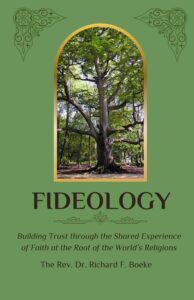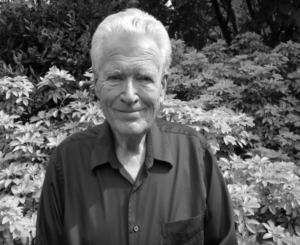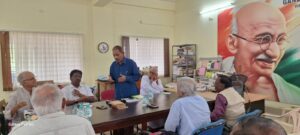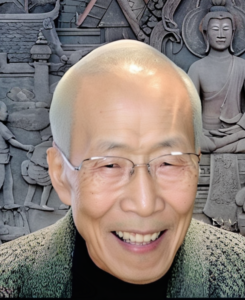Rev. Dr. Richard Boeke’s latest book is Fideology : Building Trust through the Shared Experience of Faith at the Root of the World’s Religions.
: Building Trust through the Shared Experience of Faith at the Root of the World’s Religions.
Fideology refers to “faith as trust. The word, coined by Richard, is based on the same Greek roots as fidelity, confidence, and bona fide. Richard credits his teacher, Professor Wilfred Cantwell Smith, and friend and mentor Huston Smith, along with many other faith leaders, with much of the inspiration for the subject of this book.
Fideology affirms that it is possible to build trust without the necessity of a common theology. Such trust-building between nations and religions is essential to overcome the present “clash of civilizations.” We need not just a global ethic, but the practice of a global virtue, TRUST.
Unitarian minister Richard Boeke has been a pioneer in the interfaith movement since the 1950s. Holding graduate degrees from both Yale Divinity School and Columbia University, and a Doctor of Divinity from Pacific School of Religion, he studied with some of the leading theologians of the 20th Century, from Wilfred Cantwell Smith to Huston Smith–the latter with which he enjoyed a long friendship. Fate smiled upon his life journey to sow seeds of peace and experience a sense of oneness, leading him to real-life encounters with everyone from Pope Pius XII, to Jomo Kenyatta, Malcolm X, Erik Erickson, Charles Schultz, and Nancy Pelosi, as well as lasting friendships with Shinto priests, Muslim imams, and Sikhs. He was instrumental in furthering the mission of the International Association for Religious Freedom (IARF), and received the 2018 IARF Distinguished Service Award.
The book is part personal faith journey, part autobiography, part resources for liturgical services, and part scholarly discourse. This compilation is a documentation of a remarkable life’s work, weaving the personal the political, and the spiritual into a tapestry-like tribute to world peace. It provides a valuable record of the religious and secular discourse on many IARF themes throughout its history, and captures crucial moments in the development of interfaith work in the past century.
The book is available as an e-book (Kindle) or paperback on Amazon.







One Response
I know this sounds – and may be – simplistic, but living by the Golden Rule requires trust that the people you are interacting with will likely not harm you, are likely sociable, and are likely open-minded, at least on some subjects. It seems to me to be a version of Fideology. Living by the Golden Rule requires trust, and desiring to live by it inspires trust. I really love the ideas at Charterforcompassion.org.
I met you through Rev. Ken MacLean. He may soon be moved from assisted living to a nursing facility, part of Asbury Village in Gaithersburg, Maryland. He hasn’t been able to maintain his social connections for some time, but he really brightens when people make contact.